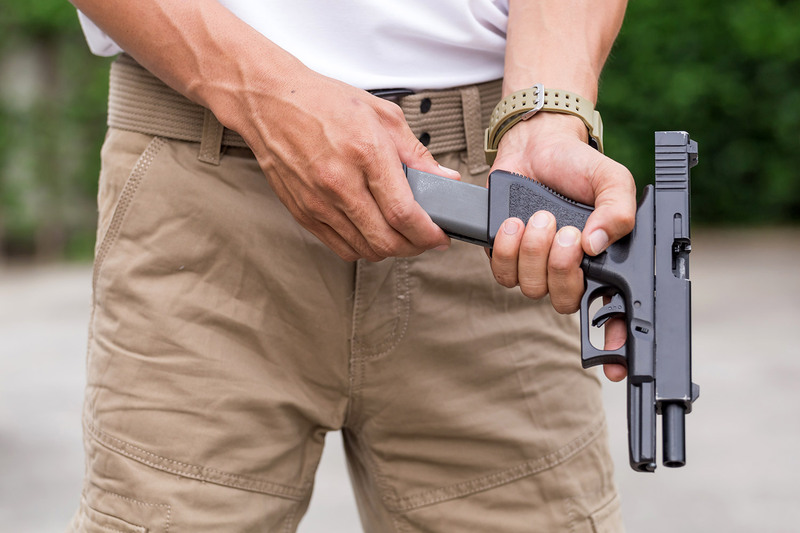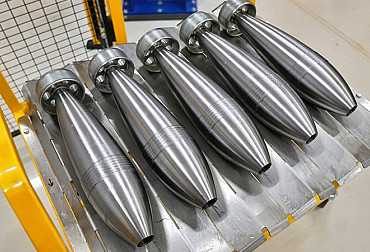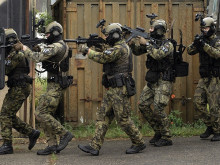MPs are debating a high-profile amendment that could change the Arms and Ammunition Act by 202
Today, the Chamber of Deputies of the Parliament of the Czech Republic has on the agenda of its 105th session the discussion of an amendment to Act No. 119/2002 Coll. on arms and ammunition, which should modify the current Act for a transitional period until 1 January 2026, when the already approved completely new Act will come into force. This so-called micro-amendment to the Arms Act was approved by the Government at its April meeting. The amendment has once again stirred up emotions surrounding the purchase of weapons.

At another recent meeting, the Government approved the so-called Amendment Act, i.e. the Government's bill amending certain regulations in connection with the adoption of the Arms and Ammunition Act and the Ammunition Act. This legislation incorporates the links, references and terminology of the new law into the other regulations. It will be recalled that the proposal would introduce two points to the current Arms Act, namely mandatory reporting of suspicious transactions by dealers and the power for the police to seize weapons on the basis of information or opinion of a public authority. At the same time, it should be recalled that the conclusions of the investigation into the December murder at the Faculty of Arts and the Klánovice forest are still not known to the public.
The aforementioned amendment will undoubtedly have an impact on arms dealers, which is why we approached experts who deal with the relevant agenda to share their experiences.
Mandatory reporting of suspicious transactions by traders
First, we asked a few questions about the issue of reporting suspicious transactions to Ivo Hofman, a licensed dealer and owner of the PROARMS CZ arms and ammunition shop.
Why do you think there is such emotion around the subject? On the face of it, it seems quite sensible for traders to report suspicious transactions?
Yes, it makes sense to me to some extent. I kind of miss the point when, for example, someone buys multiple category B weapons at once for which they have received a purchase permit from the governing body, or when, for example, sport shooters buy multiple rounds of ammunition for the sporting season at discounted prices. From my point of view, this may make some sense, for example, when buying large quantities of over-the-limit magazines with a valid exemption. However, those who think about it a little deeper must admit that getting around this "suspicious" purchase by, for example, splitting it up in time or place is probably more than easy...
What is the actual transaction of arms and ammunition now? How does the customer prove himself?
The customer has to present a valid firearms licence and, for some categories of weapons, a one-off purchase permit, after which the validity of the firearms licence is verified when the transaction is registered in the police Central Register of Weapons (CRZ), i.e. practically online. The customer is also obliged to register the weapon with the relevant police department and present the weapon for inspection within 10 working days of acquisition. This ensures that the transaction is double-checked.
How do such transactions take place via the e-shop? Can guns and ammunition be sent by post, for example?
No, you can't. You can only reserve ammunition or a gun and then physically pick it up with valid documents or permits.
Does the dealer know how many guns or ammunition the customer already owns? Does it see other transactions the customer has made with other dealers, for example?
No they don't see that, they only see their given sale.
Is there any way to determine what a "normal quantity of ammunition" is? Are there any "behavioural patterns" among customers in terms of, for example, the amount of ammunition or guns purchased, types, etc.?
It's hard to say, for example, customers buy ammunition in larger quantities also to keep the same batch of ammunition that they have verified for sporting purposes, for example. There are also more purchases because of the discounted price and so on. In general, it is naive to think that someone can be more or less dangerous with more or fewer guns. This reasoning seems silly by its very nature, and fortunately, even states to the west or north of us have moved away from it...
How will merchants behave if someone comes to shop without proper authorization? That is, if the customer has, for example, a firearms license and no purchase authorization? Or if they don't have a firearms licence at all and want a weapon that requires a firearms licence?
Here it is really necessary to distinguish whether the customer has a ZP and "didn't realize" or didn't know that for a particular model of weapon it is necessary to have a purchase permit, or whether it is someone who does not have a ZP and consults the conditions of obtaining it and then buying a weapon. Or it may be someone who is trying to obtain ammunition or a weapon without proof of identity. In this last case, it's already a red light, which for us means non-standard, risky behavior.
Authority of the police to seize weapons on the basis of information or opinion of a public authority
Regarding the second problematic point of the amendment, namely the authorisation of the police to seize weapons on the basis of information or an opinion of a public authority, we asked for an interview with Mgr. Tomáš Gawron, who is also the founder of the project zbrojnice.com.
Why do you think there is such emotion around the subject? On the face of it, it seems quite sensible to allow the police to secure the weapons if they get a report from a public authority.
At a basic conceptual level, the debate over this provision was essentially decided by a student of the Faculty of Arts of the UK committing mass murder. Amendments to this provision, which were pending in the House, then fell under the table without any substantive debate. At present, however, it is primarily a legislative and technical problem. The draft amendment to the current law was presented as incorporating the provisions of the new Weapons Act, which will come into force in 2026, into the current Weapons Act. Unfortunately, the present proposal falls short of this stated objective. In fact, it extends the powers of the police in relation to category D weapons, for example, air rifles. This is correct in the existing legislation in relation to the seizure of a weapon, which is a de facto act by a police officer just intervening on the scene, where, by the nature of things, a mistake is unlikely. However, the introduction of this power in relation to category D weapons in the case of seizure, i.e. decision-making from the table, is unacceptable. At its core, it is a case of acting on a tip-off, and the officer making the seizure decision has no way of verifying that the person concerned has, or should have, the weapon in respect of which he is making the seizure decision. Category D weapons such as air rifles are not registered anywhere. And if the person called upon does not voluntarily surrender them, he has to endure police entry into the dwelling. (Note: Category D weapons are freely saleable at 18 years of age under the current law. These are for example: paintball guns, inactive torso guns, teaching weapons, air rifles). It is absurd to think that if the police are investigating a suspected homicide, they will not dare enter a house without a warrant. But if they should seize an air rifle for which they have no way of verifying whether the invitee ever owned it, the police will de facto write the search warrant themselves. Section 12 of the Charter guaranteeing the sanctity of the home already limps on one leg because of boiler inspections; this proposal, if passed, will shoot him in the other knee.
So what is a public authority? Who all falls under this definition?
There is a plethora of public authorities. For example, any school cafeteria falls under this definition. But it does not really matter, because the police are also a public authority. The provision is drafted in such a way that the reason for the seizure is 'information of a public authority'. That information can therefore be any information addressed to the police, because the moment it is delivered to the police it already becomes information of a public authority. Whereas hitherto it has been tied to clearly defined grounds and headings, this is essentially a 'catch-all provision'. It is worth noting that this provision was originally pushed into law by BIS on the grounds that there was a need to be able to respond to potential radicalisation not covered by other grounds for seizing a weapon, while at the same time not being given the prerequisites to proceed through the normal criminal law routes. Which makes sense. But the result is, unfortunately, a wording that goes back in spirit to 1989.
A similar measure has been approved for the new gun law that will come into force in 2026. How do you think it differs? And will any differences allow for different interpretations?
In addition to the change concerning air rifles and other weapons of category D/NO, another difference is the explicit regulation of the next steps of the police in the law effective from 2026. This is absent in the proposed amendment. The police officer handling the case and the holder are left in legal limbo in the proposal as to what and how to follow the seizure of the weapon.
Does the provision in question have any remedies? How will a citizen be able to proceed if "reported" inadvertently or deliberately falsely?
If you are asking about the future Pavlik Morozovs, as an attorney specializing in necessary defense and divorce law, I dare say that Czech law is short on liars. Unfortunately, few are so stupid as to, as you say, "report" in a downright self-incriminating manner. As to the action of the holder in question himself: section 57(8) of the Arms Act provides that the seizure shall continue as long as the reasons for the seizure continue. This is essentially a Kafkaesque provision, as the onus will be on you to prove that you do not pose a serious danger to internal order or security. I think that three years later, the average citizen with good legal representation might have a chance of convincing a panel of the Supreme Administrative Court of that. That there would be an official in the administrative proceedings itself with the courage to overcome the contrary conclusion reached earlier in the decision by another official would really surprise me.
Could these two provisions prevent a possible repetition of the events that took place in December 2023 at the Faculty of Arts of Charles University and in Klánovice forest?
From the information known so far, it appears that this was not a sudden movement of the mind, but, as in most cases known from abroad, a long-term and detailed planning. If relevant information in this respect had existed earlier, then the current arrangements can already be handled by the normal procedures of criminal law. Which is also the preferred option because it will make it impossible for a potential perpetrator to carry out an attack by other means. Think of Bohumin 2020 or the French Nice in 2016. Or, for example, think of the Slovak jihadist in Prague in 2019 and his apartment full of chemicals. As for the clause about suspicious purchases, here I myself am curious to see what the police will publish after the investigation is concluded. So far, everyone is just trying to guess in what direction the man was actually suspected. I understand that the sheer number of guns is "weird" to the non-gun public. But it's just the opposite: he didn't need eight guns and thousands of bullets to commit the attack. As counterintuitive as it may seem, the information known so far about his purchases prior to the attack does not lead to a conclusion of criminal preparation as much as it does to a conclusion indicating an interest in the technical and sporting aspects of guns. However, in general terms, without reference to this particular tragedy, I can understand why this provision is proposed, and I am rather bothered by its vagueness.





















